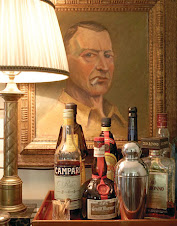
Vintage posters auctioned off at Swann Gallery with Nicholas Lowry conducting the action
By Phyllis Furman
Daily News staff writer
Monday, June 22nd 2009, 4:00 AM
Simmons/News
Public relations exec Stephanie Rabinowitz stood in an East Side auction house and listened intently as the crowd was coaxed to bid during a sale of vintage posters.
“I wonder how much it will get,” she whispered, pointing to a poster she’d bought 10 years ago in Paris and was now selling.
“I need the money,” explained Rabinowitz, 41, who works for herself out of her Upper East Side apartment. “I need to pay my bills.”
The piece, circa 1960, by renowned French fashion illustrator René Gruau, fetched $425 that day. After paying a 25% commission and other fees to Swann Auction Galleries, Rabinowitz cleared $272, about $180 less than what she’d paid for it.
But she was able to use the money to help pay her American Express bill.
With the economy retreating and several million Americans losing their jobs, New Yorkers are searching their closets, garages, basements and attics for collectibles and other household items that someone else might buy.
They are handing over vintage toys, sets of dishes, baseball cards, furniture and clothes to auction houses and online auction sites hoping to generate cash.
Despite the image of multimillion-dollar sales of 19th century masterpieces, auction houses often handle far more modest collections.
“An auction house is an extremely viable way to convert legitimate collectibles and antiques into cash,” said Nicholas Lowry, president of Swann, who appears on PBS’ “Antiques Roadshow.”
Philip Weiss, another “Roadshow” regular who owns an auction business in Oceanside, L.I., that specializes in sports memorabilia and vintage toys, said auctions can be a better alternative to selling through consignment shops or Craigslist.
“The value is you are getting your item to the right market,” Weiss said.
He’s been fielding calls lately from people who recently lost their jobs. “They don’t have to sell yet, but they’re making plans to sell in six months,” Weiss said.
Marcia Cooper, who runs GeneralEnterprises.net, a Fort Lee, N.J., business that’s acts as a middleman assisting eBay sellers, said her listings have surged 20% in the last year as more distressed sellers have tried to raise quick cash.
The people she guides in selling possessions run the gamut from middle-class New Yorkers to formerly upscale women now forced to sell their Gucci and Cole Haan shoes.
“People are saying, ‘I can do my supermarket shopping for a week by selling these boots,’” said Cooper, who also tutors eBay sellers. “They are going to get a faster turnaround on eBay than if they went to a resale shop.”
One of Cooper’s students, Christina Montayne, 40, of Allendale, N.J., turned to eBay six months ago, partly because the salary of her husband, Kevin, also 40, a retail footwear buyer, had been cut sharply. The couple fears losing their home.
So far they have raised $2,500 selling everything from kids shoes and toys to cookie jars. They even sold for $70 a pair of cleats that hikers attach to their boots, which Kevin had bought for $4.
“It helps buy the groceries,” Christina Montayne said of the money she’s raised on eBay. “It helps make ends meet.”
Auction houses typically charge commissions ranging from 10% to 25%, as well as other fees. Generally, the lower the selling price, the higher the commission.
Ebay usually charges 8% to 15% of the selling price, as well as a listing fee and a payment processing fee.
While eBay can match buyers and sellers quickly, it can take months from the time you hand over an item to an auction house till the actual sale. And, of course, there’s no guarantee your treasured possession will sell.
While Rabinowitz sold her French poster at a loss, others were much luckier.
One seller was a family who’d bought a tabletop at a flea market 25 years ago for $25. By chance, they recently found that stashed inside was a treasure trove of posters published by Charles Mather, a company known for 1920s work-incentive posters with phrases like, “Success is Built on Confidence.”
The 23 posters took in a total of $14,000.
“People don’t realize there is cash in their bookshelves,” Lowry said. “There is cash on their walls.
A new book from Rizzoli; the iconic Le Bristol Paris
-
Located in the heart of Paris, the *ICONIC* Le Bristol palace hotel has
pampered elite guests from around the world since 1925. This new gorgeous
volum...
2 days ago

















No comments:
Post a Comment